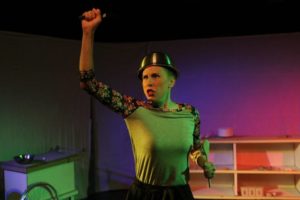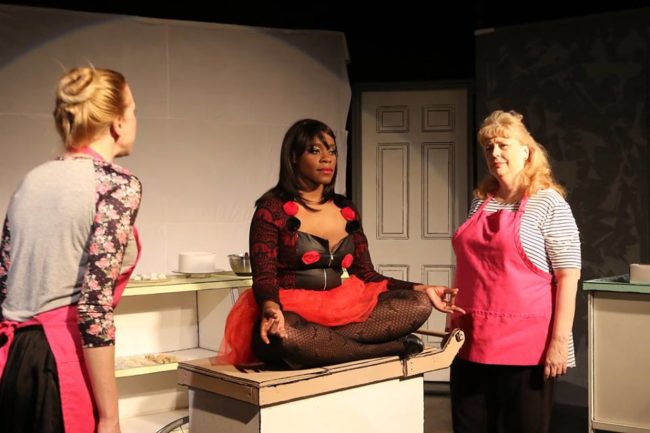Surprises and baking do not mix. But surprises, much like baking for some, are a part of life. And you must learn to embrace the surprises along with the expected and the planned, lest you find yourself guarded off in a fortress, trapped from the rest of the world— be it in the reality of your mind or the actual reality of your physical existence. In a delightfully baked surprise, The Strand Theater company welcomes the world premiere of Amy Bernstein’s Exit Pluto to the stage as their second mainstage feature during this inaugural season in their new home in Hamilton. Directed by Alice Stanley, this absurdly realistic and realistically absurd piece of performance art offers a critical examination into the most basically complex and complexly basic tenant of earthly existence: change. Bizarrely beautiful and beautifully bizarre, Bernstein’s new work is food for thought indeed.

In a world which is threaded together by chaos, and its own set of rules are in play to make sure that said chaos can flow freely into explosive dervishes of excitement, a cohesive sense of aesthetic is important. The creative design team, assembled under the resilient direction of Alice Stanley, includes the luminary Lana Riggins, the constructively functional Kate Smith-Morse, the erratically aural Max Bent, and sartorially savvy Heather Johnston. Each lending their particular vision of creative chaos to the bakery beast that is Exit Pluto, the end result— a hybrid of realistic and cartoonish elements of both sight and sound— is a vividly amalgamated tapestry draped over the reality of Betty’s Bakery.
Riggins, on lights, makes stark shifts in the continuity of the play’s reality with her colorful lights. Using color and light, or absence thereof, to demarcate clearly the difference between a moment happening in live time versus one in recollection or a tangential thread of abnormality inside the mind, Riggins draws map of sorts, a visual guide to the play’s outline of reality to better assist the audience in their understanding of everything that is happening. Augmented by the aural additions of Max Bent, whose sound effects are crisp and well-timed, Riggins’ splashes of shadow and light even go so far as to enliven characters. This is most readily witnessed with Blossom, whose moments of live action and inanimate stillness are accompanied by a shift in the light as well as a charming tinkle of magical spirited bells. Bent’s sound work is consistent throughout the performance, aiding in the intriguing yet absurd experience of the play as a whole.
By comparison, the sartorial selection made by Johnston seems somewhat plain. An ordinary scheme of black and white monochrome on both Lulu and Betty makes the sensual red featured on Blossom pop that much more. Johnston’s blank approach to color is married to Smith-Morse’s aesthetic outlay of the set, which allows the flurries of color that do infiltrate the fortress— either by ways of interloping miasma, who have materialized as other humans and sentient cake or via Riggins’ lighting effects— to play out heartily. Smith-Morse’s blank white canvas, which looks somewhat cartoonish in places, sets up the notion for a tabula rasa, entreating the audience to the potential of chaotic delights that will soon follow.

Playwright Amy Bernstein’s core message is clearly convoluted and yet convoluted clear. Wrapped in layers of absurd fluff, sugary silliness, and other such nonsensical accoutrements that make the play itself like a decadent layer cake draped in fondant and smothered in icing, the center— in its most undiluted form is a pure and simple idea: change is inevitable, and it can either be embraced or resisted. Her approach to working this message into the world of Betty and her bakery is unique and inspiring in ways that defy description. Assessing the play at face value may initially cause a headache, much like attempting to ingest an entire seven-layer cake all in one setting. Take a moment to sit back and simply enjoy the hysteria that is unfolding around it, much the way one appreciates a glorious wedding cake or overly ornate decorative dessert from a cooking show. In this manner and with this approach in mind to Bernstein’s work, the central focus becomes implicitly clear whilst maintaining the integrity of the absurdity she has constructed around it.
Bernstein writes rich caricatures into the characters she has created. Director Alice Stanley takes these caricaturized characters to almost cartoonish levels when it comes to their over-the-top planes of existence. This is most heartily represented in the way the characters react and over-react to one another. The interplay between characters, particularly based on their behaviors with one another and the way they do or do not behave based on who else is on stage with them, is decidedly smart and speaks volumes about Stanley’s understanding of Bernstein’s work. Driving a smart pace to the show’s overall progression, Stanley also keeps the dough rising, so to speak, handling the naturally occurring lulls in the plot in a rich and emotionally grounded fashion.
The cast is small, only five performers conquering five characters, but each makes their mark on the performance. Although the character of Noushin is inherently designed to feel older, perhaps even elderly, Jessica Kim gives a sturdy effort into making her readily dislikeable. Though this character, much like that of Hector (Flynn Harne) serves the function of being an interloper, Kim’s storytelling ability, shown directly when she wends tales at Betty’s demanding request, is strong. Harne, who is less of a story teller and more of a vivid pop of sanity, sprinkled liberally with his own brand of lunacy, is functionally present, particularly in moments when it comes to telling it to Betty like it is. Both performers find subtle ways to highlight their characters in memorable fashions throughout the production.

Blossom (Bethany Mayo) does not arrive until the midway point of the production but once she does, utter calamity settles in like a thick smoke from a burned cake, not so easily chased from the kitchen once it arrives. Mayo’s character is a tricky one, a sentient cake who represents a multitude of symbolic metaphors, while actually existing within the confines of Lulu and Betty’s reality. Dripping sensuality like hot drizzled glaze, and oozing honesty like a gooey fudge center of molten lava cake, Mayo shoulders a great emotionally cathartic burden by way of the plot’s pinnacle shift. Her interactions with Lulu (Barbara Madison Hauck) are divine.
Hauck is the quintessential sugar crystal in this bakery extravaganza, caricaturized into oblivion with vocal up-speak glistening in her voice, an unthwartably cheery disposition, and a stalwart saccharine nature that will turn the blood in your veins into slippery sucrose sludge just from looking at her. Despite all of this, Hauck delivers an astonishing performance, knowing exactly when to mellow into a striking reality, weighted by a deep emotional gravity, as her character experiences change— mostly brought on by Blossom— past the midpoint of the production. Hauck’s interactions with Betty (Janise Whelan) are sublime, particularly in the subservient vein of volunteer slave to demanding task master.
The way that Whelan and Hauck play together becomes the focal point of a great portion of the production. Their shifting interactions— all over the recipe card as it were— is fascinating and has the audience leaning in to better understand their dynamic. Starting at one point and finishing at another with a zigzagging madcap journey between, the pair really catch the eye, the ear, and the heartstrings when it comes to the way they play off one another, with both performers being particularly receptive and open with each other.

Whelan, as the leading character, delivers a bombastic start to the play and seems forever mentally unsettled until she falls into step with Lulu later in the production. There is an earnestness and raw vulnerability that underlies all of her shouting and begging, her fury and her desperation. Whelan is organic on the stage; she delivers her performance like a simple and militant recipe that has been time-tested, tried and true. Her outbursts are as visceral and unsettling as her realizations and acceptances are harrowing and heartfelt. Whelan grasps Betty firmly by the dough and squeezes her into something glorious.
The production is full of sights and sounds and even smells that will entice the audience to enjoy it all the more, while digesting the core of its intention. Don’t miss this world premiere and your chance to satiate your theatrical appetite on a decadent and glorious new and absurd performance dessert.
Running Time: 90 minutes with no intermission
Exit Pluto plays through January 29, 2017 at Strand Theater Company— 5426 Harford Road in the Hamilton neighborhood of Baltimore, MD. For tickets call the box office at (443-871-1917 or purchase them online.
To read the Baking with Betty Interview, click here.

